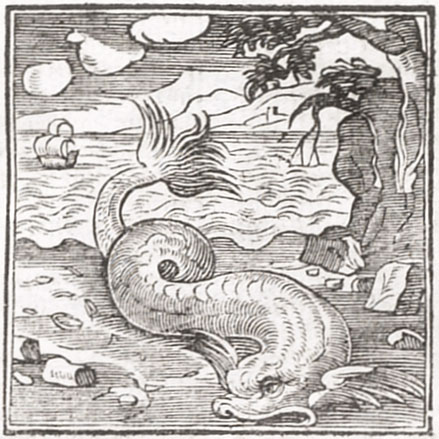
Alciato’s emblem “In eum qui truculentia suorum perierit”.
Delphinem invitum me in littora compulit aestus
Exemplum infido quanta pericla mari.
Nam si nec propriis Neptunus parcit alumnis,
Quis tutos homines navibus esse putet?[I am a dolphin whom the tide drove ashore against my will, an example showing what great dangers there are in the treacherous sea. For if Neptune does not spare even his own nurslings, who can think that men are safe in ships? (Source)]
In memoriam Aylan Kurdi, the Syrian three-year-old refugee toddler whose drowned corpse was found on a Turkish beach on 2 September 2015, and for so many others who lost their lives in that treacherous crossing.
News keeps appearing about more Syrian immigrants dying at sea. Another child’s body was found even more recently on a Turkish beach on the Aegean, this time a female named Sajida Ali. Since January 2015, at least 700 children lost their lives in the Mediterranean in similar circumstances. This brings freshly to our minds the tragic reality of the inhumane events that daily threaten to become relegated to passing oblivion and banality.
Depending on the observer’s point of view, several of Alciato’s emblems can be applied to this awful tragedy, so it is difficult to choose the most appropriate emblem to illustrate these events. These drownings occur in a region of the world that is considered the cradle of Western civilization and whose ancient mythology continues to feed the European imagination.
Is ‘In avaros, vel quibus melior conditio ab extraneis offertur‘ the best choice? But these little Arions without lyres could not attract a dolphin to carry them to shore, since there are not enough dolphins to save the thousands of humans thrown into the stormy waters by misfortune.
Could it be ‘Spes proxima‘? Castor and Pollux certainly did not show themselves in the sky at the proper moment to save their ships.
What about ‘In temerarios‘? It would be unfair to blame these desperate people of imprudence. Under unbearable duress, they took the risky path because of a lack of options instead, not because of sheer irresponsibility. This is even truer for the children, who did not have the power to choose their fate.
Certainly Aylan’s and Sajida’s parents, like their many companions in misfortune, put their hopes ‘In dies meliora‘ for their families. Alciato, in his rather rude but purposely humorous image, compares the behavior of the feeding boar, which always goes forward and never looks back, with human nature. Humans do not want hope to collapse and fail. Instead, they want what lies ahead, always looking for something better. I wonder whether the West is prepared to grant those wretches such good prospects. Without being excessively Panglossian, let’s leave room for some optimism.
Aylan’s and Sajida’s fate, the same as that of over 3,200 refugees this year alone, seems rather like that of the dolphin in emblem ‘In eum qui truculentia suorum perierit,’ exposed to the dangers of the insidious sea if they cannot count on Neptune’s benevolence.
This is the same fate as Helle, who fell from the flying golden-fleeced ram in search of safety, giving name to the Hellespont. Should not that part of the sea where the Syrian boy lost his life be rebaptized Aylanpont? Europa, who once crossed those same waters on the back of a divine bull, must revisit the classic myths in order to regain her spirit.
Rubem Amaral Jr.
(Independent Researcher)
Reference
Andrea Alciato’s Emblemata, (Padua, Petro Paulo Tozzi, 1621). Emblem 167.

